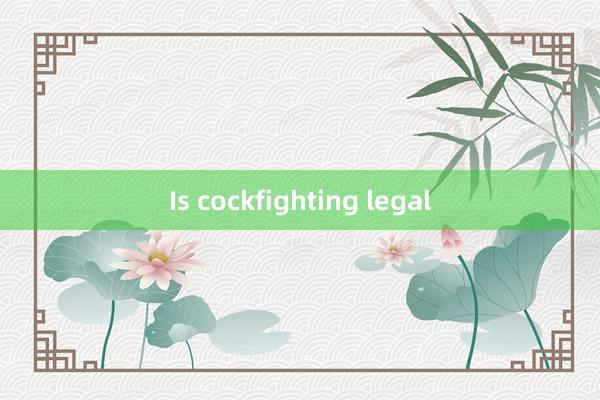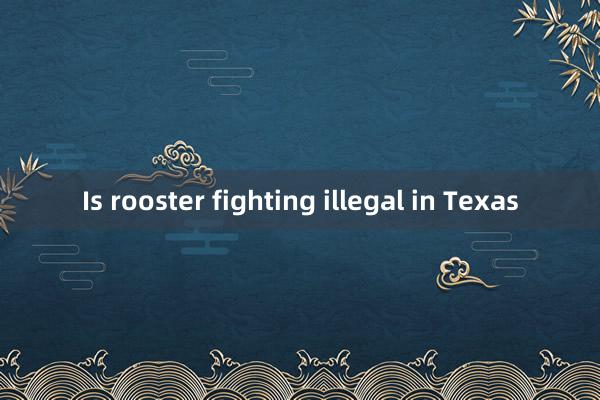Is cockfighting legal

Is Cockfighting Legal?
Cockfighting, a centuries-old blood sport where roosters are forced to fight for human entertainment, has been a subject of intense controversy. While it may have deep cultural roots in some regions, the legality of cockfighting varies significantly across the world. This article will explore the legal status of cockfighting, examining the reasons for its prohibition or regulation, and the broader implications on animal welfare and society.
The History and Cultural Significance of Cockfighting
Cockfighting dates back thousands of years, with roots in ancient civilizations like Rome, Greece, and India. In many cultures, especially in parts of Asia, Latin America, and the Caribbean, cockfighting has been seen as more than just a sport—it is a tradition passed down through generations. For some, it symbolizes bravery, competition, and manhood. In the Philippines, for example, cockfighting (known as sabong) is not only a popular pastime but also part of local festivals and religious events.
Despite its historical and cultural significance, cockfighting has become a contentious issue globally due to growing concerns about animal cruelty. As societies become more aware of the rights and welfare of animals, cockfighting has increasingly been viewed as inhumane and barbaric, leading to widespread legal bans and crackdowns.
The Legal Status of Cockfighting Around the World
The legal landscape surrounding cockfighting varies dramatically from country to country, with some allowing the sport under specific conditions and others banning it outright.
-
United States: In the U.S., cockfighting is illegal in all 50 states. The ban began with individual state legislation, and by 2007, Louisiana became the last state to outlaw the practice. Federal law also prohibits cockfighting through the Animal Welfare Act, which makes it a felony to transport birds across state or national borders for the purpose of cockfighting. In addition to this, spectatorship and the promotion of cockfighting are also considered criminal offenses. However, illegal cockfighting rings still operate in some rural areas, despite the harsh penalties.
-
Europe: In most European countries, cockfighting is banned. The European Union takes a firm stance against animal cruelty, and cockfighting falls squarely under this umbrella. Countries like the UK, France, Germany, and Spain have outlawed the sport for years. However, there are some regions, particularly in rural areas of Spain, where the practice may still occur illegally or semi-publicly, though the authorities regularly crack down on such activities.
-
go88 thiên đường
Latin America and Asia: The situation is more complex in parts of Latin America and Asia. In Mexico, for instance, cockfighting is legal in many states and is seen as part of the cultural heritage. The same applies to countries like the Philippines, Thailand, and some regions of Indonesia, where cockfighting remains popular. In these places, cockfighting is not only legal but also regulated, often taking place in arenas or under government supervision. However, this legal status is increasingly being challenged by animal rights groups, and a number of countries in these regions are seeing growing pressure to ban the sport.
The Case Against Cockfighting: Animal Welfare Concerns
The primary reason for the illegality of cockfighting in many parts of the world is animal cruelty. In a typical cockfight, roosters are equipped with sharp blades or spurs attached to their legs, making the fights particularly brutal and often resulting in the death or severe injury of one or both birds. These animals are forced to fight until one is incapacitated, all for the entertainment of human spectators.
Animal rights organizations argue that cockfighting is inherently cruel and inhumane. The birds are often kept in poor conditions, subjected to harsh training regimes, and are pitted against one another in fights that are both violent and bloody. Supporters of animal rights believe that no cultural or historical justification can outweigh the suffering experienced by the animals involved.
Moreover, cockfighting often serves as a breeding ground for other illegal activities, such as gambling, drug trafficking, and organized crime. These activities exacerbate the societal harms associated with the sport, providing further justification for its prohibition.
The Counterargument: Cultural and Economic Factors
Despite the strong opposition from animal rights advocates, defenders of cockfighting often point to its cultural and economic importance. In regions where cockfighting is legal, it is not just a form of entertainment but also a significant source of income for many people. Breeding fighting roosters is a lucrative business, and cockfighting events attract large crowds, generating revenue for local communities.
Some argue that in areas where poverty is widespread, cockfighting offers economic opportunities that would otherwise be unavailable. In these communities, banning cockfighting could lead to financial hardship and the loss of a key cultural practice.
Conclusion
The legal status of cockfighting is a complex issue that varies around the world. While it remains legal in some regions, particularly where cultural traditions hold strong, many countries have banned it due to concerns about animal welfare. The global trend is moving towards more stringent animal protection laws, and cockfighting is increasingly seen as a relic of the past that has no place in modern society.
As debates around the legality of cockfighting continue, the key challenge for governments is balancing cultural heritage with the ethical concerns surrounding animal cruelty. Regardless of its legal status, the future of cockfighting seems uncertain in a world where the welfare of animals is increasingly prioritized.
Nice88 free 120 register no deposit bonuswww.prohap.com













